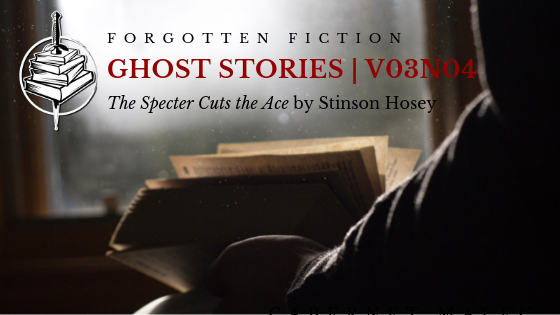[ezcol_4fifth]
Right now, as you are reading this there are thousands of works of fiction sitting on dusty shelves waiting for our adventurous minds to seek them out. It is the goal of this little effort of mine to seek out these shuttered tales and see how well they hold up. Are they hidden gems full of contemporary meaning? Or are they clunky relics of the past who’s time has long slipped through the hourglass? Let us find out.
Today’s Forgotten Fiction:
The Specter Cuts the Ace by Stinson Hosey
![]()
[/ezcol_4fifth] [ezcol_1fifth_end]

[/ezcol_1fifth_end]
[T]he title of this story is what caught my attention. It seemed intriguing, although admittedly I didn’t know what exactly what was meant by “cutting the ace”. It’s the cover story for Ghost Stories Magazine, which is usually also a good sign, since I have to believe that the editors of these periodicals must have wanted to put their best foot forward. The scan of the yellowed pages was fun to dive into; so let us examine this little blast from the past.
The story begins with the narrator named Stinson spying on his wife as she gets ready for a night out on the town. We learn that there are rumors of perhaps infidelity on her part with his friend Randolph. The narrator comes across as hot tempered and jealous by nature, and as I read along I couldn’t help but feel like he was unjustified in his actions/emotions. We learn that the couple are planning a trip to Washington, but that he would rather not go.
Approaching his wife who’s name we learn in Jean, the narrator sees in her minuscule reactions things that confirm his growing suspicions. We find out that they are both leaving for separate trips, the wife leaving with friends to “The Forresters” and then via a late night train, and our narrator by other means. Their dialogue starts off light, with Stinson raining compliments down on his wife, but quickly things get a bit weird. Stinson makes a comment about being jealous of another man, and his wife picks up on a bit of his underlying rage.
We then learn about a weird quirk in their relationship. Apparently they agreed to be together for five years, during which time if they fell in love with another they would be allowed to leave the relationship. At the time when I read this I was thinking that this might be a marriage of convenience, so that perhaps the woman could become an american citizen or something. Our narrator then might have caught feelings for her, and complicated this plan that they had going.
Stinson then bids farewell to Jean before they can really conclude their conversation and jumps off into a cab. He reflects as he is speeding away how he has felt followed the last few times he has left, but since he can’t seem to spot anyone on his tail he gives it no further thought. What he does however is say the following:
Jean Riviere had been mine for three years. And, pledge or no pledge, I intended to keep her as long as I chose. I did not live her; I had never expected her to love me. To her I was simply a middle-aged protector- and a source of money, gowns, and jewels. Her pledge, I believed, was merely an effort to salve a passing qualm of conscience. But she could not trick me. My hands clenched at the thought. I would not be made a laughing-stock.
So needless to say my opinion of our narrator sank even further. He’s basically keeping a woman bound to him out of some strange loveless pledge, and then still conjuring up rage against her and and another man. Either he’s lying to himself about his own feeling towards Jean, or he’s just psychotic.
Stinson continues to feel like he is being followed, and so ditches the cab and walks a distance in front of a series of reflective shop windows. He watches the windows to see if he is being followed, and discovers that yes he is! There are two men watching him from across the street, one looks to be a rather clumsy detective type, and the other looks like an aged and stooped version of himself. Doing his level best Stinson evades his pursuers in the train station, making it appear as if he boarded the train, but secretly slipping out the back and to the street behind the building.
The narrator then goes through several motions with Sinson, sowing how cautions he is being, and building a bit of tension as he comes closer to completing his plan. He goes to a poor set of brownstone houses, and we learn that he had rented a room there. He then dresses in disguise, a shabby coat over evening ware, and puts a silenced revolver in his pocket. He then slinks his way to the Golden Peacock, the ritzy night club that he knows Jean will be at with another man.
Stinson greases some palms and makes his way unnoticed to an upper balcony that overlooks the dance floor below. His rage grows as he watches Jean flirt and dance with Randall (her new love). He watches as they ascend to the upper level where he is, and he remains hidden nearby as they take a private booth that overlooks the inn courtyard.
As an aside, as I was reading this story I thought about how cool it would be to experience a swinging 1920s nightclub like this Golden Peacock. The smokey rooms, the live swing music, the glitzy art deco, flapper dresses and Stetson have a certain allure to me. I wasn’t sure just where this story was taking me, but I appreciated the fun images it was conjuring up in my mind along the way.
We learn here that Randall and Jean intend to marry and run away to japan together. Randall wants to run off and leave immediately, while Jean wants to party the night away knowing that she is truly free with Stinson out of town.
Our narrator knows that they will have to return to his house to pack Jean’s things, and so he leaves the club to go lie in wait for them. We get another glimpse of the strange doppelganger that is seemingly following our narrator here, but Stinson just shrugs it off. It’s one of those things where I wish I hadn’t read the title of the story; because knowing that there is going to be a specter kind of spoils any kind of surprise about what this strange double actually is.
The author does a good job of conveying the stuffy tense atmosphere of Stinson’s apartment as he waits to kill the two lovers. His nerves are tense, and he paces and plays solitaire to try and keep focused. Ultimately he slumps in a chair, waiting and listening for the two to come. But when Stinson looks up he sees- his doppelganger!
In a very corny exchange we learn that the look-alike is really a sort of spirit of his better self. Translucent and independent, the specter tells Stinson that he was exorcised from him during his teenage years, and accuses him to be driven only by selfishness and hate. Stinson denies this, asserting that he is only reacting to Randall cheating him out of Jean. The specter tells Stinson that he has never been a fair man, and would never take a risk unless he was sure to win; and so a contest is set. Each will take turns cutting the deck of cards until one draws an ace, if the doppelganger cuts the ace first Stinson will leave and not come back, and if Stinson wins he will no longer be haunted by the spirit.
As you might have guessed by the title of the story the specter cuts the ace, and Stinson honors the bargain. He leaves a note for Randall telling him that he knew about everything and that he shall not return. The end.
Was this a scary story? No. Was this an innovative story? No. This was entertaining only for the atmosphere and the build up of tension as we learn that the narrator intends to commit murder. There is no twist, or unexpected challenges, nor is there really any kind of explanation as to why Stinson’s ghostly better self comes into play at all. It’s a battle of conscience that does not really involve the narrator learning any sort of lesson save for the fact that he will lose a game of chance. Not recommended.
Final Score
Horror | 01/10
Innovation | 2/10
Entertainment | 4/10
Sexiness | 2/10
[supsystic-gallery id=2]


Very nice post. I just stumbled upon your blog and wanted to say that I’ve really enjoyed browsing your blog posts. In any case I’ll be subscribing to your feed and I hope you write again soon!
Your point of view caught my eye and was very interesting. Thanks. I have a question for you.
sms onay hizmetine sitemizden göz atabilirsiniz.
Can you be more specific about the content of your article? After reading it, I still have some doubts. Hope you can help me.